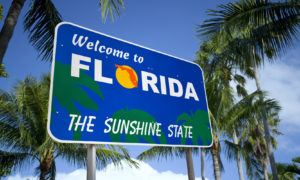Kris Krane Of 4Front Ventures Talks Cannabis Compliance And License Acquisition
Having founded 4Front Advisors in 2011, Kris now serves as president of 4Front Ventures. Prior to forming 4Front, Kris served as director of client services for CannBe, a pioneer in developing best practices within the medical cannabis industry. Kris has dedicated his career to reforming the nation’s misguided drug policies, having served as associate director of NORML from 2000 to 2005 and executive director of Students for Sensible Drug Policy from 2006 to 2009. He currently serves on the National Cannabis Industry Association board of directors. We sat down with Kris to talk about the future of cannabis retail operations under strict compliance and the process of getting started in the industry.
Marijuana Retail Report: What made you want to start 4Front Ventures, and why did you choose to focus on helping retail operations entering the industry?
Kris Krane: 4Front Advisors started in 2011 as a consulting firm to help folks navigate the licensing processes, particularly in competitive license application markets, and then to help them set up their retail operations, their retail businesses. Essentially providing all of the operational protocols and policies and procedures, and operations documentation that they need in order to run an effective and professional retail cannabis dispensary.
We originally came out of a legacy business called CannBe, which was an offshoot of Harborside Health Center in Oakland, where we developed a lot of our initial intellectual property and operating protocols at Harborside. That was really where we came from was from the retail world. Having spent most of my career in the reform movement and always seeing 4Front as a vehicle to help advance the issues as a whole. We really focus on helping to professionalize the industry and demonstrating that this industry can be done professionally and responsibly. The retail side of the business is the area that the public interacts most directly with. For instance, the public doesn’t ever really see a cultivation facility or extraction lab, but they do interact with the dispensaries and those who work in them, even those who aren’t patients or a traditional cannabis customers, you’ll get used to having that in their community. When you can demonstrate that cannabis can be distributed in an environment that is highly professional and responsible, it really changes public perception. It changes people’s minds about what cannabis is and what cannabis distribution looks like, or it changes the stereotype that most of us have. Most people have from growing up in a provision of this environment of marijuana sale being some students doing a street corner drug deal between themselves, or some burnout selling weed out of their basement, it really changes that perception to a beautiful well-run retail environment that even if you’re not a consumer or not a patient, you’re not going to be ashamed or embarrassed to have in your community. You felt that that side of the business was going to do more to help advance the overall cost than anything else that we can do. Which is why we initially set our focus on retail. We have done quite a bit more since then, but that was the original thought there.
Marijuana Retail Report: For a lot of these shops, navigating a lot of these laws and regulations are extremely difficult. I feel like they sometimes make it be ridiculously difficult. How should an entrepreneur looking to get into the retail cannabis industry get started? What should be their first step in your opinion?
Kris Krane: First step will be identifying where they want to go, because that’s really going to inform how they should wind up approaching this. If you want to set up a retail store, say somewhere in California, it’s going to be a very different process than if you want to do it say in Massachusetts, or in Illinois, or in Arkansas. All of which have retail licenses on the books right now. You really should know where you want to go, so that you can figure out what the regulatory environment is there and what the opportunities are to obtain a retail license. In some cases, you’ll be able to apply for a license at the municipal level, like you might in California. In other places you would have to apply for that license at the state level, which also probably would include some degree of local approval. In other states, all of the licenses are already granted, so you’re on the opportunity to get into the retail business, would be to acquire an existing license. Even once you figured that out, then the process of going about applying for one of those licenses or even applying one of those licenses is going to be quite a bit different from state to state, and each state is going to have its own challenges. You really need to identify first where you want to go, so that you can then set out the roadmap for how you go about obtaining one of those licenses. We are the exact type of organization to help navigate that process.
Marijuana Retail Report: What would you say is the hardest part of that process? Would it be to obtain the license? Would it be to make sure that you’re maintaining compliance?
Kris Krane: Everything is challenging. This is not an easy business. Compliance is really difficult in a lot of places, but number one is going to be applying for the license, that is a challenge. In the majority of states, you have to apply for a license which is usually a competitive application process. You not only have to apply, but you have to put forth a better application than the other applicants around you, or the other applicants in your state, so that in them itself is a real challenge. These applications, as you go state to state, get more and more competitive and more and more challenging to win. If you’re trying to acquire a license, you’re trying to come to terms with the existing license holder and the valuation of that license can be quite challenging. There are often disputes amongst the existing license holders, and so trying to navigate those could be very difficult. Yeah, obtaining that license is challenging. There are places where it’s easier than others, but by and large, it’s always challenging and usually quite an expensive process.
Marijuana Retail Report: What would be the number one thing for a startup overlooks when beginning their retail cannabis operation?
Kris Krane: I would say if you’re applying for a new license, particularly in the competitive markets, the number one thing that people tend to overlook is the importance of nailing down their real estate early. There are so much of those license applications stems from the property where they plan to apply. We see a lot of instances where a company will set out to apply for a license, but they prioritize the other aspects of their application or putting their team together, putting together a great advisory board, all the things that you have to do for an application. But they don’t realize just finding real estate itself can be very challenging. Most municipalities have fairly restrictive zoning as part of where this can go, and then within that restrictive zoning, there are sensitive use setbacks to got to be 500 feet or 1,000 feet or sometimes more from parks, churches, schools, places where it’s congregations, day cares, and a number of center of users particularly those associated with places where the children are, so you have an already restrictive zone in the municipality you want to locate in, and then within that restrictive zone. It’s even more restrictive to get to sensitive use setbacks, and then you have to try and find a landlord that’s willing to lease for this use or sell for this use. You’ve got to negotiate with those landlords, they tend to want way too much money for these properties once they realize that you have limited options, and then maybe the only game in town, they try and gouge you on prices and so negotiation is very challenging. Then there’s so much of the applications from your floor plan, your security plan, your staffing plan, security overlays, all these things that really comes from having the application nailed down. Also, your local support where you can’t generally obtain local support from the local government, and so you tell them where do you plan to locate. We see a lot of instances where your folks focus on a lot of other elements of the applications which are important, but they get their property nailed down too late and they really wind up scrambling and sometimes it’s too late.
Marijuana Retail Report: What would you see is the hottest new battleground for both recreational and medical cannabis and why?
Kris Krane: The biggest battlegrounds are right now in terms of competitive license applications today and it changes often. But right now it’s Pennsylvania and Ohio. Arkansas, kind of hot on their heels, although I don’t expect Arkansas to be quite as competitive as Pennsylvania and Ohio, it’s not nearly as big of the market. But in Pennsylvania for example, the license applications are already in, they were supposed to be awarded in early June. From what we’ve heard, they received something … It was over 500 total applications in Pennsylvania that included … I think it was somewhere around 270 or so for cultivation, and another 240 or so for dispensaries. When you look at the cultivation, it’s 270 plus applications, they’re granting 12 licenses. These are just absolutely brutal as far as the competition there, and you have a lot of really experienced operators, particularly the experienced operators from the Northeast and Midwest that are competing in these markets. In Pennsylvania for example, they break the states down by region and they’re granting two licenses in each of the six regions. Just looking at the breakdown of applicants, you can pick any region in Pennsylvania, and you’re likely going to be able to identify four to five really well-regarded operators from around the Northeast and the Midwest in addition to other local groups who maybe really well-plugged in locally, they may have also partnered with coordinators from another part of the country. How the state is going to go about determining who the two best are amongst the group like that, it’s going to be really challenging. Frankly, it’s gotten to the point where they have so many qualified operators applying for these licenses that what determines the winners from the runners-up is actually pretty arbitrary. What section of the application did they weigh higher at any given part of the day and who wound up reviewing the applications will honestly be the deciding factor in a lot of it. I was looking at Pennsylvania as a bloodbath right now. Ohio, those applications are due in just a few weeks, and by all accounts, we’re going to see a very similar situation that we’re currently looking out in Pennsylvania. Then I believe the next data after that is Arkansas because it’s a much smaller state and market and it’s a lot more remote. There really aren’t any viable medical marijuana markets anywhere near Arkansas. I don’t expect there to be the same level of competition as you’re getting in these Northeast areas like Pennsylvania or Ohio, so I think Arkansas won’t be quite as much of a bloodbath.
Marijuana Retail Report: 4Front Advisor takes clients from any market, correct?
Kris Krane: We have a strong focus on these competitive markets, so we haven’t done any work in Colorado, Washington, Oregon, and extremely limited work in California, because these haven’t had the same types of competitive license applications with protected licenses where we really are the experts at navigating those regulatory environments.Those markets also tend to be a lot more over-saturated. We just largely stayed away from the western states, at least the west coast, with a handful of quality exceptions. We also have an operations company, underneath 4Front Ventures called Mission Partners. These days, we usually have one application in a state that we actually control, and then in other parts of the state that are not competitive, whether we apply it will take on an additional couple of clients. We handle fewer clients than we used to, and because of that, we split it between the operations that we control and ones in which our clients control and we’re providing them with support.
Marijuana Retail Report: Operating in multiple markets, how does 4Front manage to stay on top of the ever-changing and confusing, and sometimes even conflicting regulations and compliance measures?
Kris Krane: It’s kind of what we’re built to do. We built a team with a really strong regulatory background and we’ve been doing this from the beginning. Starting in California, we’ve gone from Rhode Island to Washington, D.C. to Arizona, Massachusetts, Nevada, Illinois, Maryland, New York, and Delaware. We’ve dealt with applications in all of these states. We’ve really built a platform where all of our intellectual property and the materials we developed are built to be adjusted, scaled, and customized for the state regulatory environment that we’re going into next. We’ve built our whole company and our whole platform around being able to navigate these different regulatory environments. I think it’s a little bit less of a challenge for us than it is for a lot of others. In fact, we’ve been very successful at going state to state both ourselves and on behalf of clients, which is something that, even some of the more successful operators particularly out west, that generally had a very difficult time doing.
Marijuana Retail Report: Are you concerned with the current political atmosphere for the future of retail medical cannabis?
Kris Krane: You have to be concerned with the current administration, particularly the current justice department. We are very focused on compliance, and making sure that everything we do is fully compliant with state laws and regulations and the states that we’re operating in. We certainly will not allow anything to cross state lines, so even though we have operations in multiple states, they’re all self-contained operations within those states. We will stay very compliant with state laws, making sure that we don’t violate any kind of ordinances, but of course just being in the space, you have to have something siren over the current justice department in what Jeff Sessions might wind up doing here, I think that’s still very much an open question.
Marijuana Retail Report: Do you see nationwide legalization as still being a possibility?
Kris Krane: I don’t think that’s a possibility under this administration, but I do see it as something that will likely happen in the next 10 to 20 years. Having said that, I do think that we will see further reforms federally under the current administration, particularly because there’s a real appetite in Congress to do it. I don’t think it’s something that will be spearheaded by the administration, I think it’s something that will be spearheaded by the legislative branch by Congress. That means things like you’ll fix this to the 280E, provision of the IRS tax code, I think that’s something that we may see happen over the course of the next couple of years. I think we may also see a fix to banking where banks will be officially allowed to do business with state-legal marijuana businesses. I could even see a scenario in the next few years or something like the Carers Act, is passed which if that would happen, it would exempt state license and state-compliant medical marijuana businesses from the Controlled Substances Act. They would be completely free from federal intervention. I can see these kinds of incremental changes happening over the course to the next three years, but it’s hard to see a push for full legalization. We never even saw that under the Obama administration, which is probably the most … not probably, was absolutely the most friendly administration on this issue. We never saw them come anywhere close to advocate it for full legalization. I see that as kind of a non-starter under the current administration, maybe I’ll be wrong, but very unlikely, although I do see these incremental reforms as still realistic possibilities in the current political climate in Washington.
Marijuana Retail Report: Having been in this industry for as long as you have, and as involved with many industrious organizations as you’ve been, what’s the craziest thing you’ve seen that you can talk about publicly while in working in the retail cannabis industry?
Kris Krane: You caught me off guard with that one. I don’t know. There’s just so many crazy things that have happened around the license applications, right now to these permanent application processes. Because it gets so competitive and so political, there are so many laws around … Every single one of them seems to have a different crazy scenario. In Massachusetts for example, the first round of license applications where they granted 28 or 29 winners, and then there was just this massive flood of allegations that people were lying on their applications, and political favoritism, and it was a former congressman who got the three highest scores of anybody in the state despite not having any operational experience. In the state of Maryland for example, and they submitted these applications and they told everybody that they’d have answers in two months and it took them 13 months to review the applications. All these groups are just literally sitting around, twiddling their thumbs for 13 months, waiting for the state to get back to them. That was pretty nuts. I’ve worked an application in the city of Berkeley, I think there were 13 applicants for one license in Berkeley. It took them 15 months to go through the process to grant that license, including some things that I just never heard of anywhere like they granted bonus points to applicants that consolidated with one another, essentially like two applicants were asked to merge with each other in order to get more points in the process, to give themselves a better chance of winning, which is crazy when you think about it. You’ve got two different groups with two different properties, and two different investor groups, and two different operations plan that are told midway through like, “Hey, you’ll have a better chance of winning if you can consolidate your companies.” That was pretty nuts.
Marijuana Retail Report: What do you see is the future of this industry?
Kris Krane: That’s a big question. I think as we look out to the future, particularly as federal law changes and you start to see the ability for businesses to cross state lines. I think we’re going to see a number of things happen. I think we’re going to see somewhat of a commoditization of the product. I think you’ll start to see really large scale industrial cultivation projects which … I think we’ll see a lot of the cultivators, particularly the state-based cultivators, particularly the state-based cultivators in the east coast will not be able to survive, when they’re facing 100 square acres or 1,000 square acres of cultivation space in northern California or Oregon or Washington, where the conditions for outdoor cultivation are so much better, or even greenhouse cultivation are so much better than they are in the east coast or the Midwest. Once cultivators throughout the Pacific Northwest are allowed to ship product across the country, and you could set up massive farms, I think you’re going to see the prices come down dramatically. It becomes the hub of cultivation. They will see a major shift in that respect. There generally are a limited number of vector licenses in most states, and you’re already starting out in a lot of the states with a protected number of retail stores. I think that’s going to hold to a degree, it will all expand somewhat, but I think what we’re seeing is the formation of what would likely be a protected retail market, especially in the eastern half of the country where you have more limited licenses, and where you have a history of more limited liquor licenses as well. They kind of fits into what a lot of these northeast states are already doing. I think the retail licenses in the long-term are probably better protected than the cultivation licenses. I also think we’re going to see much larger companies start entering the space once they loosened up a bit at the federal level. I would expect to see in larger companies, particularly from the alcohol and tobacco industry, come in and start gobbling up a lot of the more successful operators in the United States, rather than to have to reinvent the wheel. They want in, so rather than reinvent the wheel, they’re just going to come out and acquire a lot of the more successful companies. I think we’re going to see in the nearer term a big disruption in the market from Canada. You’ve already seen Canadian companies start to come in and buy up companies in the United States, I think we’re going to see a lot more of that over the next few years, because these companies in Canada are federally legal and they’re about to have a full adult use market there. They can go raise money on the public markets in Canada, so they’ve got access to a much cheaper capital than any companies do here in the United States. Right now, these Canadian companies are raising money at just ridiculous valuation. There were purely speculative valuations. We’ve just seen companies like Canopy Growth, raise money at $1.5 to $1.6 billion valuations, which means they can go out and raise $100 million and only give away 5% of their company, which allows them to come in and massively overpay for businesses down here, in order to build up their asset portfolio. I think that’s going to be really disruptive here because the U.S. investors are not going to be able to compete with these Canadian companies. I think that will be the first major disruption. Then with the big companies coming in and starting to gobble up some of these players, particularly the multi-state players, the groups that have been able to navigate multiple markets and have a license portfolio across the United States. I think they’re going to be really attractive acquisition targets either for these Canadian companies or for new alcohol, tobacco, or other bigger U.S. companies and agricultural companies. I think we’ll see that kind of consolidation happen down the road. On the products’ side, we’re starting to see a shift to compound formulations. Rather than the traditional strain, we’ve already seen a big shift in the market from flower to oil, and to other types of infused projects. In the more established markets on the west coast, you’ve gone from 80 to 90% of sales in dispensaries in flower sales to flower being the 30 to 40% of sales, with the rest of that being infused products in oils and big can cartridges and edibles. But right now, when you get to the states’ can cartridges, you get those oils, typically they’re either Indica, Sativa or Hybrid, or blend of different strains, or they’re strain-specific. You’ll get a super silver haze, or an OG or whatever as your cartridge, what we’re starting to see is as extractions can be done on a much larger scale. You’re able to isolate the individual cannabinoids to individual terpenes. I know these companies are already working on this, but I think this can take up a big part of the market in a few years are compound formula oils. Something that’s not a Blue Dream or a Sour Diesel, for example, it would be something called like Calm, or Chill, or Creative, or something like that. It’s going to be a specific formulation of cannabinoid in terpenes, that’s formulated for a desired effect, whether it’s a medical effect or a psychoactive effect. I think we’ll see a much bigger move towards that because a compound formulation like that is going to be much more consistent than getting, say a strain-specific oil, where it’s dependent on how that strain was growing and where that strain was grown. There’s little differences from crop to crop even in the same cultivation facility, whereas if you’re isolating individual cannabinoids and individual terpenes, and you can then compound those into a specific formula and then oil that’s going to be essentially the same consistency every single time. I think we’re going to see a big movement on that front over the course to the next five years.




































